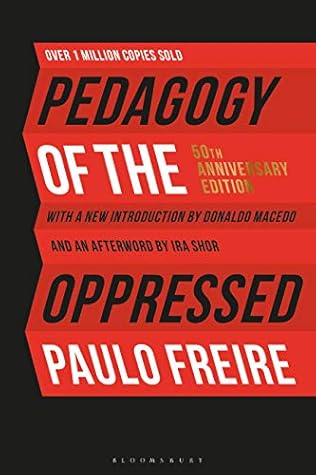More on this book
Community
Kindle Notes & Highlights
by
Paulo Freire
Started reading
December 21, 2023
To the oppressed, and to those who suffer with them and fight at their side
In order for this struggle to have meaning, the oppressed must not, in seeking to regain their humanity (which is a way to create it), become in turn oppressors of the oppressors, but rather restorers of the humanity of both.
This, then, is the great humanistic and historical task of the op-pressed: to liberate themselves and their oppressors as well.
Only power that springs from the weakness of the oppressed will be sufficiently strong to free both.
That is why the dispensers of false generosity become desperate at the slightest threat to its source.
True generosity consists precisely in fighting to destroy the causes which nourish false charity.
It is a rare peasant who, once “promoted” to overseer, does not become more of a tyrant towards his former comrades than the owner himself.
The “fear of freedom” which afflicts the oppressed,3 a fear which may equally well lead them to desire the role of oppressor or bind them to the role of oppressed, should be examined.
The oppressed, having internalized the image of the oppressor and adopted his guidelines, are fearful of freedom. Freedom would require them to eject this image and replace it with autonomy and responsibility. Freedom is acquired by conquest, not by gift. It must be pursued constantly and responsibly. Freedom is not an ideal located outside of man; nor is it an idea which becomes myth. It is rather the indispensable condition for the quest for human completion.
The central problem is this: How can the oppressed, as divided, unauthentic beings, participate in developing the pedagogy of their liberation?
A real humanist can be identified more by his trust in the people, which engages him in their struggle, than by a thousand actions in their favor without that trust.
Those who authentically commit themselves to the people must re-examine themselves constantly. This conversion is so radical as not to allow of ambiguous behavior. To affirm this commitment but to consider oneself the proprietor of revolutionary wisdom—which must then be given to (or imposed on) the people—is to retain the old ways. The man or woman who proclaims devotion to the cause of liberation yet is unable to enter into communion with the people, whom he or she continues to regard as totally ignorant, is grievously self-deceived.


